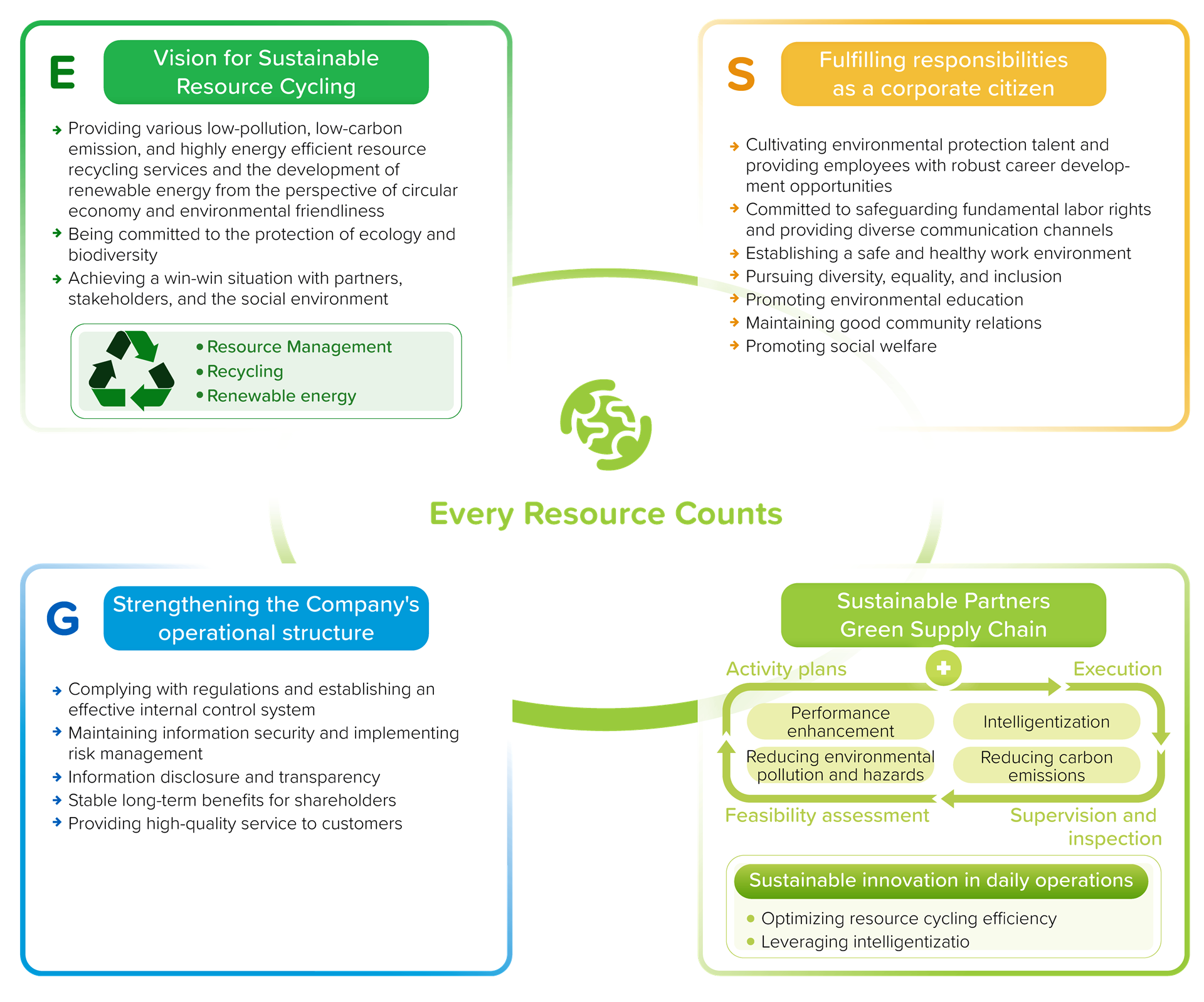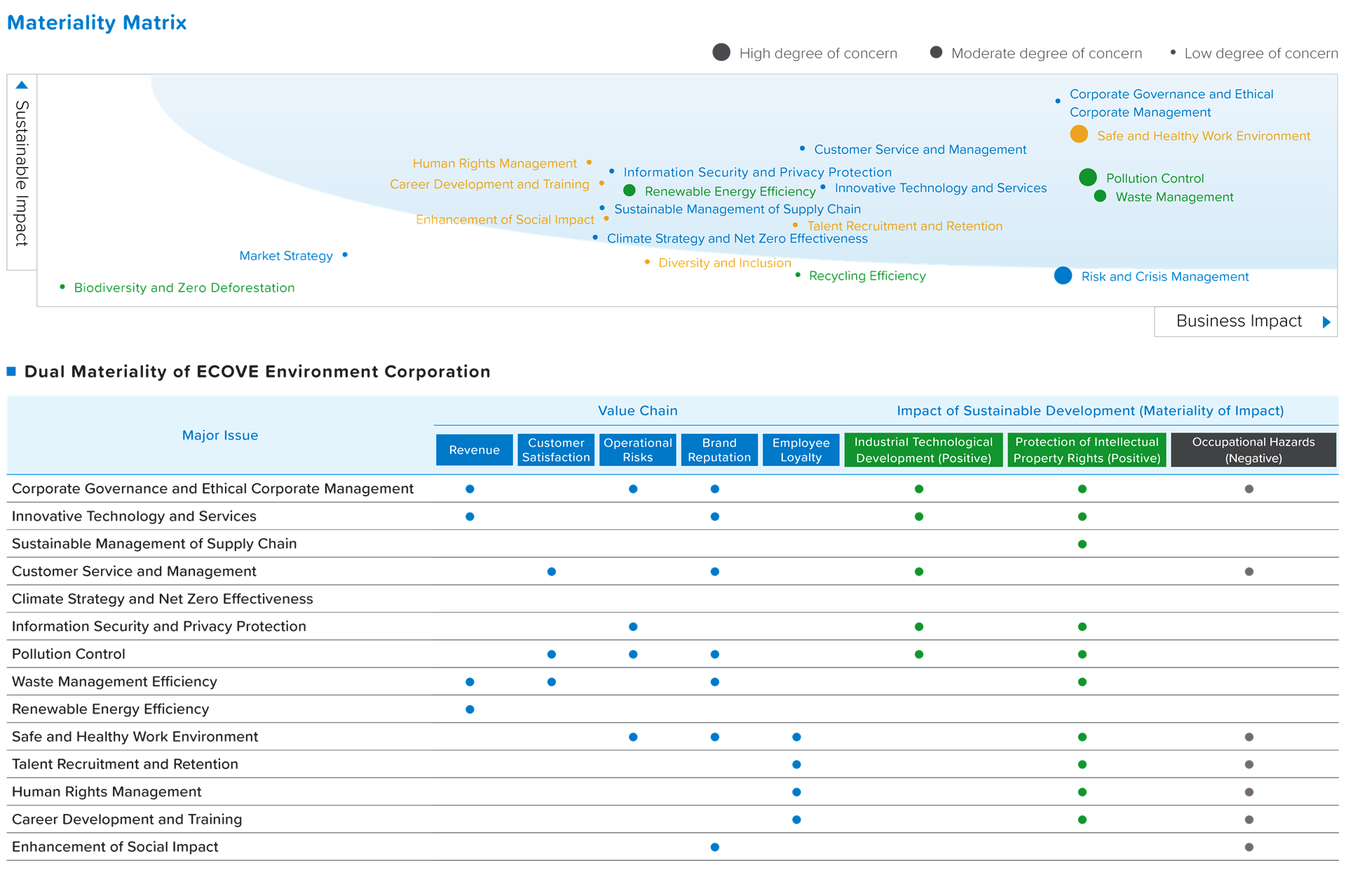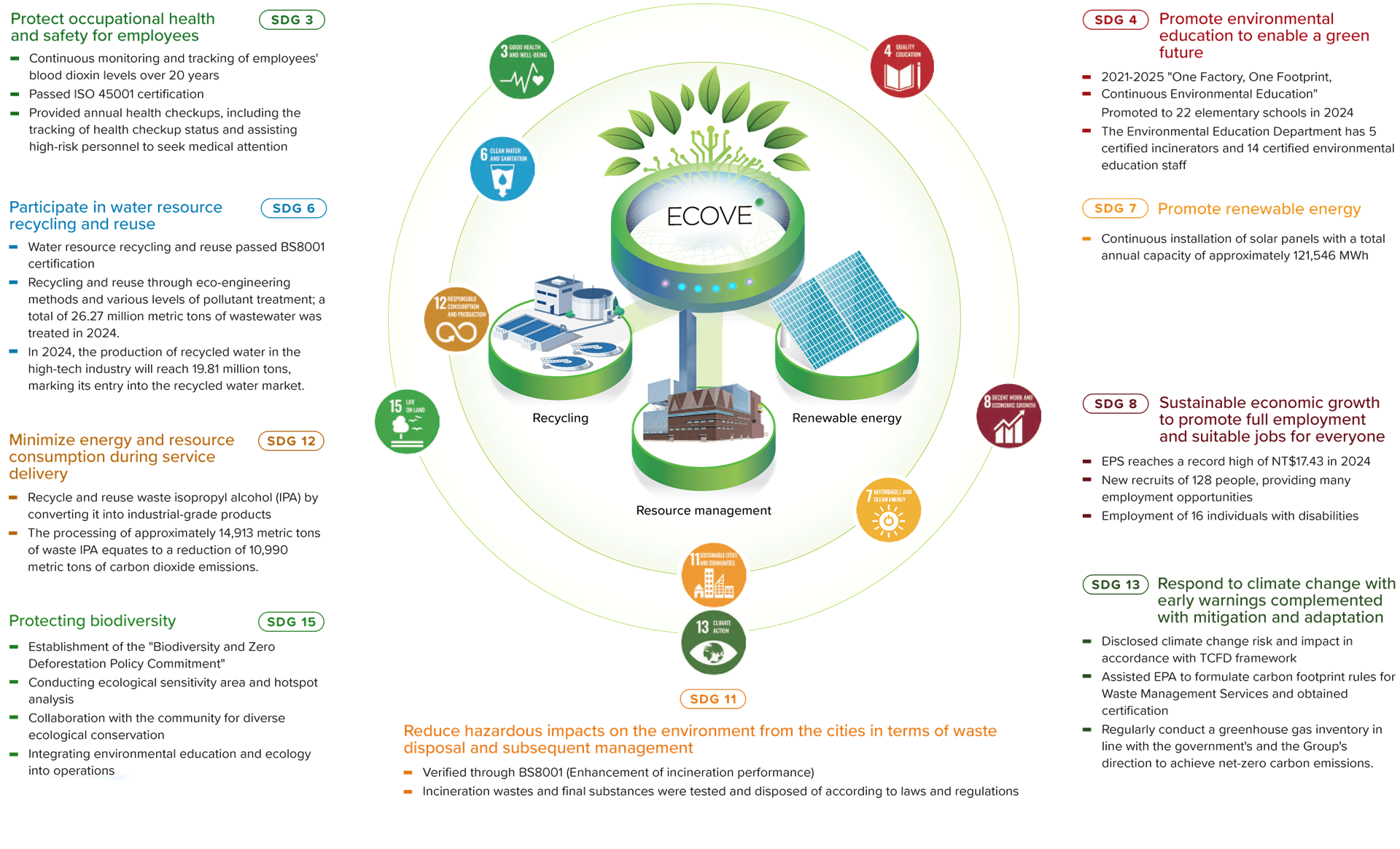ECOVE is actively promoting sustainable development, expanding its business scope based on the development of four core fields: "Resource Management," "Renewable Energy," "Recycling and Reuse," and "Mechanical and Electrical Maintenance and Rectification." We not only pay attention to global and domestic trends in sustainable development, but also actively respond to the United Nations Sustainable Development Goals (SDGs). We disclose our sustainability performance with transparency and integrity, ensuring that all relevant actions and strategies are clearly presented. Under a comprehensive sustainable management framework, ECOVE not only ensures stable operational growth but also strengthens the practices of corporate social responsibility. The Sustainability Report serves as a bridge for ongoing dialogue, collaboratively creating and enhancing sustainable value with all stakeholders, as the Company is committed to long-term ESG benefits.
Sustainability Policy and Promotion Structure
Sustainable Policy and Vision
Every Resource Counts is the core spirit of ECOVE in promoting sustainable development. We have deeply embedded the operational model of the circular economy into our corporate culture and established the vision of making sustainability the core competitive advantage and essence of the Company. To achieve this goal, ECOVE adopts a strategy of aligning our core business with the SDGs and addressing key issues, and embeds sustainability concepts into all aspects of the Company's operations.

To further practice the spirit of corporate sustainability, ECOVE has developed the "Guidelines for Sustainable Development," which pledge to implement concrete actions in the following three key areas: enhancing corporate governance, developing sustainable environmental practices, and upholding social welfare. Furthermore, ECOVE strengthens the disclosure of information regarding corporate sustainability development, ensuring that the Company's sustainable actions can be reported transparently and clearly to stakeholders, while actively responding to societal and market expectations. We believe that only by balancing economic benefits with social and environmental responsibilities can we achieve long-term sustainable operations, thereby creating a more competitive and valuable future for the Company.

Corporate Sustainability Promotion Framework
The Board of Directors is the highest decision-making body of ECOVE in promoting sustainable development, and it is responsible for coordinating and guiding the Company's affairs related to corporate social responsibility, environmental protection, and corporate governance through the Sustainable Development Committee. The committee is chaired by the Chairman, with the President serving as the commissioner.It includes the Chairman, President, and department heads of subsidiary companies as members. The committee convenes twice a year. The first meeting focuses on reviewing the progress of sustainable development initiatives for the first half of the year, while the second meeting reviews the outcomes of the current year's implementation and discusses the sustainable development plan for the following year, ensuring the effective implementation and monitoring of each strategy. To effectively implement sustainable development strategies, the committee has established three dedicated task forces: the Social Engagement Task Force, the Environmental Protection Task Force, and the Business Governance Task Force. These task forces consists of presidents of each subsidiary and department heads, with the primary objective of promoting sustainable development. Each task force plans and executes strategies within specific areas to ensure the comprehensive and in-depth implementation of the Company's sustainability development goals.
Impact Assessment Process

In addition, the Sustainable Development Committee reports annually to the Board of Directors on the execution results of sustainabledevelopment (including resolutions of the Sustainability Report) and future plans. The Board of Directors is responsible for overseeing the Company's sustainable development policies, strategies, and objectives, and regularly reviews the effectiveness and implementation of each policy. The most recent report was submitted to the Board of Directors in the fourth quarter of 2024, presenting the sustainable annual plan for 2025. The report covered various topics of emphasis, including talent retention and recruitment, occupational safety and health, social engagement, renewable energy development, greenhouse gas inventory and management, recycling and reuse initiatives, air pollution prevention, water resource management, and corporate governance. ECOVE will continue to implement various sustainable development measures based on these plans, ensuring that the Company can achieve its economic objectives while also making a positive contribution to society and the environment. Starting in 2022, sustainable performance is linked to key performance indicators for directors,presidents, and senior executives in order to promote sustainable development. The remuneration of the Company's directors and managers follows the guidelines and criteria set forth by the Remuneration Committee and the Board of Directors, including the "Guidelines for Director Performance Evaluation and Remuneration System" and the "Guidelines for Manager Performance Evaluation and Remuneration System." The remuneration takes into account industry norms, as well as the Company'sperformance, individual contributions, and achievements, aiming to provide reasonable compensation.
Remuneration Structure for Directors
The remuneration for the directors of the Company can be divided into compensation, salary, and business execution expenses:
- Director compensation: According to Article 23 of the Company’s Articles of Incorporation, "The compensation for directors and the Chairman of the Board shall be determined by the Board of Directors based on their individual contributions to the Company and with reference to industry standards. "
- Director salary: According to Article 29 of the Company’s Articles of Incorporation, "If the Company has profits for the fiscal year, it shall first retain an amount to offset accumulated losses, and the Board of Directors may allocate up to two percent of the profits as director salary. "
- Business execution expenses: The expenses primarily consist of transportation and attendance fees; these are established based on the standards provided by listed companies or industry peers. The remuneration standards for those concurrently serving as directors and supervisors in all companies in the financial report are the same.
Remuneration Structure for Managers
The salary structure for managers (including those who concurrently serve as directors) consists of fixed and variable compensation:
- Fixed compensation includes base salary, allowances, and bonuses, which are determined based on professional qualifications and market remuneration levels.
- Variable compensation includes bonuses and rewards, which are determined based on the Company's overall performance, business unit considerations, and individual relative performance contributions. It aims to align with the Company's core values, demonstrate leadership and management capabilities, and take into account factors such as future risk implications to reasonably determine the compensation.
Managers (including those who concurrently serve as directors) are also subject to annual performance assessment. The assessment encompasses the achievement of various financial goals (approximately 65% weightage), and non-financial performance indicators (approximately 35% weightage). In addition, the annual salary adjustments and performance bonuses are calculated based on their performance evaluation results compared to general employees. The performance results, salary adjustments, and annual bonuses are reported to the Remuneration Committee and the Board of Directors for discussion:

The rules governing the rest of the employees' compensation and benefits are the same as those of the general management. However, there are exceptions for the allocation of stock options and pensions for senior managers, where the distribution of warrants is reviewed by the Remuneration Committee, while pension is set out based on the coverage rate of the old pension mechanism and is controlled by the Pension Supervision Committee and an actuarial firm to protect the retirement rights and interest of senior managers as employees.
Long-term Incentive Awards for Managers
- Long-term incentive awards are granted in the form of stock-based compensation, which is deferred for five years and calculated based on future stock prices at the time of fulfillment. This ensures that manager compensation is linked to the Company's long-term performance.
- In the event of significant risk events that could impact the Company's reputation or internal mismanagement, or other risk events related to
- personnel misconduct, the issuance of manager bonuses may be affected, reduced, or withheld, or previously granted bonuses and virtual share rights (including events occurring during the five-year deferral period) may be subject to recovery at the discretion of the Company.
The Remuneration Committee and the Board of Directors shall regularly review the reasonableness of the remuneration, and shall review the remuneration system from time to time according to the actual operating conditions and relevant laws and regulations. They shall not guide the directors, president, and vice president to engage in acts beyond the Company's risk appetite in pursuit of remuneration, so as to avoid improper circumstances such as the Company suffering losses after payment of remuneration. The distribution of remuneration to employees and directors is regularly reported to the shareholders at the annual shareholders' meeting.
International Financial Reporting Standards (IFRS) S1, S2 Disclosure Progress Planning
In accordance with the "Taiwan's Roadmap for Integrating with IFRS Sustainability Disclosure Standards" issued by the Financial Supervisory Commission on August 17, 2023, the Company continues to manage the implementation of the introduction plan in accordance with the reference guidelines and relevant regulations issued by the competent authority. The timeline for the implementation of the IFRS Sustainable Disclosure Standards is planned as follows, and their progress of implementation is reported to the Board of Directors every quarter:

Materiality Analysis
ECOVE is committed to addressing the specific challenges and opportunities of sustainability by incorporating the principles of inclusiveness, materiality, reliability, and the eight reporting principles of the GRI Standards 2021 GRI 3, which incorporates the principles of inclusiveness, materiality, reliability, and the eight reporting principles. Through a meticulous materiality analysis process, we identify the key issues for ECOVE and develop management policies to promote and achieve sustainable development.
Identification
We adhere to the five principles of the AA1000 Stakeholder Engagement Standards (SES): Dependence, Responsibility,Tension, Influence, and Diverse Perspective. Through discussions, six major stakeholders were identified: shareholders/investors, customers, employees, suppliers/subcontractors, the community, and the government. In terms of sustainability, we gather both internal and external perspectives to identify issues related to ECOVE's operations. Our sources include internationally recognized sustainability standards and norms such as GRI, SDGs, TCFD, TNFD, IFRS S1/S2 (including SASB), and Guidance for Identifying Sustainable Economic Activities, etc. In addition, we consider our internal operational goals, sustainability requirements of the Group, international industry benchmarks, stakeholder feedback, and external expert recommendations to develop a comprehensive list of 19 issues relevant to ECOVE's operations. In the 2024 Sustainability Report, ECOVE has restructured and optimized its material topics compared to the 2023 edition as follows:

Analysis
ECOVE conducted a Critical Issue Analysis focusing on three dimensions: "Stakeholder Level of Concern", "Organizational Operational Impact" and "Sustainable Development Impact". By conducting internal and external surveys and analyzing the results, ECOVE identified material sustainability issues affecting the Company.

•A total of 122 questionnaires were collected.
•Shareholders/Investors: 17; Customers: 10; Suppliers/Subcontractors: 10; Community: 12; Government: 12; Employees: 61

• The impact of sustainability issues on ECOVE's operations, including revenue, customer satisfaction, operational risk, brand reputation and employee morale, was assessed by 14 representatives from various departments.

• The materiality of sustainability issues is assessed in terms of economic, environmental and human rights impacts. Significant sustainability issues are identified based on positive/negative, actual/potential, irreparable, and value chain considerations, with input from 14 managers and colleagues.
Validation
Based on the above analysis results, after discussions among representatives of the Sustainable Development Committee and reporting to the Chairman, 14 significant sustainability issues were determined. These significant sustainability issues correspond to 14 GRI themes and 2 specific ECOVE topics. There were three significant changes in the material sustainability issues compared to last year: the addition of "Information Security and Privacy Protection," "Customer Service and Management," and "Enhancement of Social Impact." We also analyze the location of each issue within the value chain, including upstream, operations and downstream, to collect and disclose relevant information. We then establish management policies and targets to address sustainability impacts.

Stakeholder Communications and Feedback
ECOVE has implemented a variety of communication mechanisms to actively listen to suggestions, understand stakeholder expectations and concerns, and drive improvementsand enhancements. We have assessed the impact of stakeholders on ECOVE's operations using the AA 1000 SES:2015 framework and identified six key stakeholders:shareholders/investors, customers, employees, suppliers/subcontractors, community and government.

Materiality Matrix

Response to the United Nations' Sustainable Development Goals (SDGs)
Leveraging its core competencies, ECOVE began by conducting a thorough assessment of the organization's goals and practices. As a result, they identified 8 Sustainable Development Goals (SDGs) that are highly relevant to ECOVE's work. We have integrated the Sustainable Development Goals(SDGs) into our operational activities to strengthen the Company's commitment to sustainable development,minimize the impact of our operations, and capitalize on opportunities for sustainable growth.

Participation in External Organizations
Participation in Associations and Organizations
Strengthening connections with the industry and the latest technologies is a crucial strategy for enhancing service competitiveness and expanding industry influence. ECOVE enhances its service level, expands market opportunities, and shapes the future development direction of the industry by participating in various industry development and sustainable management-related public academic association organizations. This is achieved by fostering innovation, promoting knowledge sharing, and advancing technology development. In 2024, the Company participated in a total of 16 external public associations and organizations, demonstrating our commitment to deepening cooperation and co-creating value.

In addition, ECOVE has accumulated over 20 years of experience in waste incinerationoperations and has made significant developments in areas such as solar energy and recycling in recent years. In addition to being invited to share Taiwan's experience at domestic and international forums, ECOVE has also been featured in various key media.The application of optical charging and storage system technology by ECOVE has been published in a renowned international journal in 2024.

Participation in Seminars or Forums
ECOVE actively participates in national and regional environmental policies and issues, and we share more than 20 years of experience in resource cycle industry development and operational strategies with public and privategroups from government, industry, and academia, as well as the public in response to invitations from domestic and overseas governmental or non-governmental organizations. This helps to build cornerstones in the resource circular economy and ensure that we stay on top of the trends. In 2024, representatives of ECOVE attended a total of 24 lectures or forums, with the key activities listed as follows:
Industry Initiative
ECOVE actively participates in industry initiatives, leveraging its extensive practical experience to assist in the promotion of sustainable policies and regulatory development. In 2024, we participated in the "Expert Consultation Meeting on Domestic General Waste Management Strategies in Response to Climate Change," organized by the Environmental Management Administration, Ministry of Environment. We provided practical recommendations on the "Guidelines for the Organizational Inventory of Greenhouse Gases from General Waste Treatment Facilities (Draft)." This not only demonstrates the Company's professional insights into the comprehensive waste management policy but also highlights its proactive contributions to climate change adaptation strategies. In addition, ECOVE assists the Financial Supervisory Commission and National Taipei University in formulating the "Refinement of Taiwan's Guidance for Identifying Sustainable Economic Activities," providing professional recommendations for the waste management and resource recovery industries. This collaboration not only promotes the development of sustainable finance but also strengthens the overall evaluation mechanism for industry sustainability performance. In addition to policy participation, ECOVE is also committed to the sharing and exchange of industry knowledge. The Company was invited to participate in the "Greenhouse Gas Reduction Technology Forum for General Waste Treatment Facilities" organized by the Environmental Management Administration, Ministry of Environment. Additionally, the Company assisted the Industrial Development Administration, Ministry of Economic Affairs in conducting low-carbon talent training, sharing practical experiences in corporate greenhouse gas inventory and carbon reduction. This proactive knowledge transfer contributes to enhancing the general sustainability capacity and awareness of the industry. In terms of sharing experiences in sustainable governance, ECOVE actively participated in the "Sustainable Development Committee and Chief Sustainability Officers Forum" organized by the Taiwan Stock Exchange and Taipei Exchange. The Company shared its implementation experiences of Sustainable Development Committee to promote exchanges of ideas in sustainability among industries.

